- INGLEFIELD CLIP
- An elongated clip (usually of bronze, but also of a tough synthetic material)
with an eye and double-tapered gap in the beak part, making it easy for two to
be clipped together. The clips, spliced to the ends of halyards, are swivelled
to allow the halyards to move freely. With similar Inglefield clips spliced to
the ends of the hoist lines attached to flags, it allows for rapid and easy hoisting,
especially of signal flags – see grommet 1)
(also Appendix I,
clip and grommet,
halyard and splice).
![[Inglefield clip - left]](../images/v/vxt-d179.gif)
![[Inglefield clip - right]](../images/v/vxt-d181.gif)
Please note that these clips were patented in 1890
by Lieut. (later Admiral) Edward Fitzmaurice Inglefield, RN, when serving as a
signals officer in the British Mediterranean Fleet.
- INGRAILED
- An alternative heraldic term to engrailed – see engrailed.
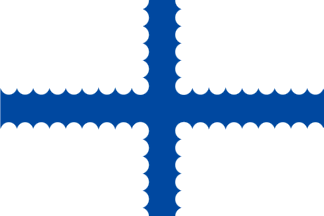
Flag of Beersel, Belgium
- INNER BORDER
- 1) The term that may be used when one border appears within, or next to an
outer border – see outer border
(also border and inset border.
2) See inset border.
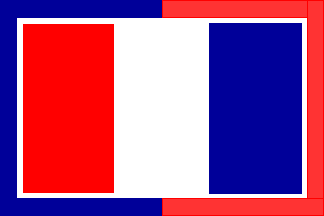
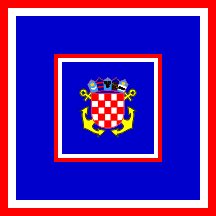
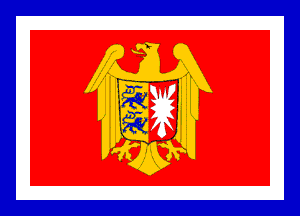
Naval Jack 1790–1794, France;
Flag of a Staff Admiral, Croatia;
Car Flag for State Secretaries, Schleswig-Holstein, Germany
- INNER CANTON
- In UK usage, that term for an area within the canton equal to one-sixth of the flag’s
total area – see canton 1) (also
canton 2)).

- INNER EDGE
- A term that may be used in describing the edge of a hanging flag that is closest to the building
to which the pole is attached, and equivalent to the bottom edge of a conventionally hoisted flag (see also
hanging flag and outer edge).

Please note that this term has been introduced by the Editors as no established
alternative could be found.
- INSET (or IN-SET)
- The term used when a charge or charges are set away from the edges of a
flag or the panel they occupy, but not in the centre of that same flag or
panel – for examples see the illustration (with an inset red chevron) below
and inset border
below (also centred,
double tressure,
off-set towards and orle).
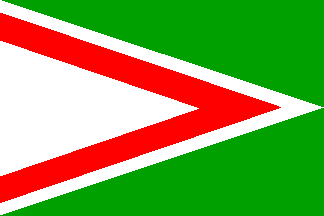
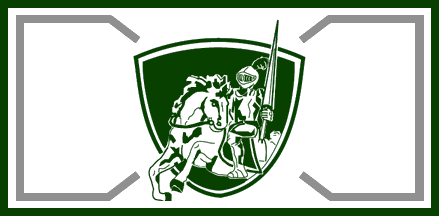
Flag of Josefův Důl, Czechia;
Flag of Elmira District Secondary School, Canada
- INSET BORDER
- In vexillology the term for an unbroken border that is inset from the edges of a flag – an inner
border – but see orle 1) (also
border, double tressure,
inner border, inset above and
tressure).
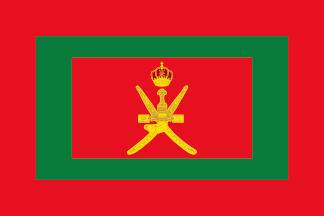
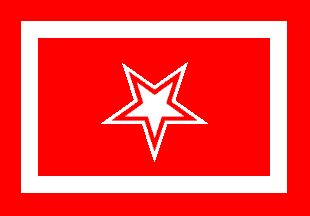
Sultan’s Standard, Oman;
Flag of the Portland & Asiatic Steamship Co., US
- INSIGNE (or INSIGNUM)
- Medieval terms for a flag, banner or ensign (see also insignia).

Speculative English Flag c1405
- INSIGNIA
- A term for the emblems of rank and distinction sometimes applied in the Middle
Ages to flags of varying sorts, and from which the word ensign probably derives
(see also ensign 5) and insigne).
- INSIGNIA-BANNER
- The term from which ensign-banner was possibly derived.
- INSTALLATION FLAG
- In middle European and some other usage, a term for those flags presented at the
installation of officials with vice-regal authority, and considered symbolic of their
military responsibilities (see also coronation flags).
![[installation flag]](../images/v/vx-hr_banjj.gif)
Installation Flag of Ban (Viceroy) Josip Jelacic, Croatia 1848
- INSTITUTIONAL FLAG/PENNANT (OFFICIAL)
- Those flags or pennants that have been officially granted and/or formally approved by
the governing body/directing authority of an institution such as a university,
college, sporting club or other similar entity, and are recorded as such in their
official documentation or proprietary website (see also
institutional flags (unofficial) below
and official flag 1)).
![[institutional flag]](../images/v/vx-ca_uab.gif)
![[institutional flag]](../images/v/vx-ca_umani.gif)
Flag of the University of Alberta, Canada;
Flag of the University of Manitoba, Canada
Please note that this category includes only those
flags listed above, and that national, sub-national, personal and corporate flags
as defined separately herein are specifically excluded (see also
sports flag 2),
national flag,
sub-national flag,
civic flag,
personal flag and
corporate flag).
- INSTITUTIONAL FLAG/PENNANT (UNOFFICIAL)
- Those flags or pennants that purport to identify institutions, clubs and other entities,
but which have not been formally approved by the relevant governing body or directing
authority (see institutional flags (official) above
and unofficial flag).
![[institutional flag]](../images/v/vx-us@f-chf07.gif)
![[institutional flag]](../images/v/vx-us@f-chf06.gif)
Flags for Supporters of The Kansas City Chiefs American Football
Team
Notes
a) It is a wide-spread practice, especially among North American Universities and
sporting clubs worldwide, for faculty members, student bodies and supporters to display commercially
manufactured flags which differ from those formally approved, and which must, therefore, be designated
as unofficial.
b) Whilst manufacturers may often have permission to use registered trademarks and logos of the organization concerned, this does not give the resulting flags official status
(see also de facto).
- INSURANCE FLAG (or PENNANT)
- The term for a 19th century flag (or pennant), now obsolete, usually showing a vessel’s
insurance number and issued by the appropriate marine insurance company, association
for mutual insurance or similar – a number flag.
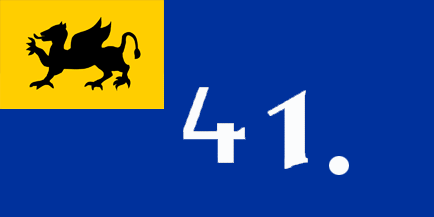
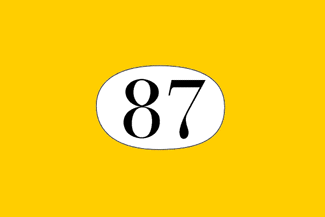
19th century Insurance/Number Flags from Rostock, Germany
Please note that this is not an established term, but has been introduced by the Editors since no
contemporary source describing such flags could be found.
- INTERLACED (or INTERFRETTED)
- The alternative heraldic terms used when two or more charges are arranged so as to form the appearance
of a united whole, as in the 1606 pattern of union jack or the symbol of the
International Olympic Committee – braced, brased, embraced, fretted or entrelacé or
interfretted (see also charge 1),
fretty, union jack 1)
and union mark).
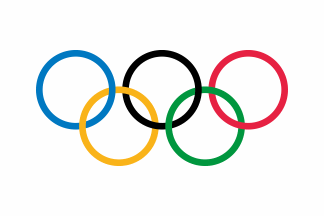
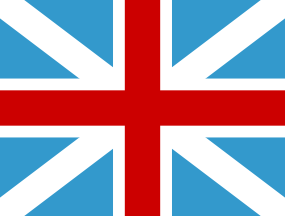
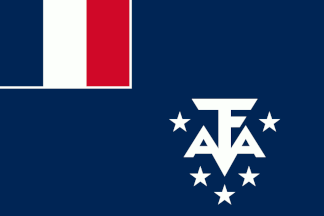
Flag of International Olympic Committee;
the 1606 Pattern of Union Flag, UK;
Flag of TAAF
- INTERMENT FLAG
- See pall flag.
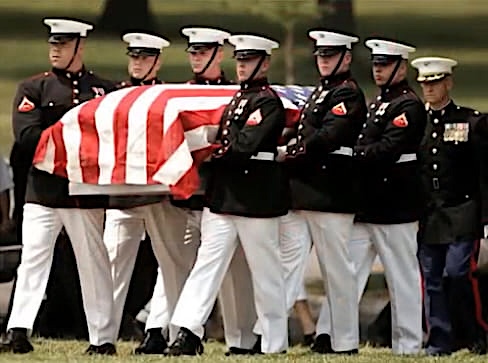
(military.com)
- INTERNAL PROPORTIONS
- See proportions 2).

- INTERNATIONAL CODE OF SIGNAL FLAGS (or ICS FLAGS)
- An internationally agreed set of flags of simple design to represent letters
of the Roman alphabet and numeral pennants, that can be hoisted singly or in groups
to convey meanings contained in the International Code of Signals (see also
blue peter,
call sign hoist,
code pennant,
complement,
diver below flag,
flag of distress,
International Code of Signals,
make her number,
numeral pennant,
preparatory flag,
pilot flag,
quarantine flag,
signal hoist,
substitute and
signal flag).
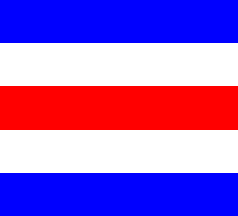
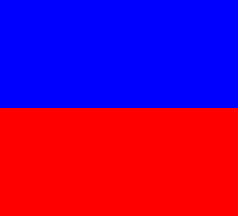
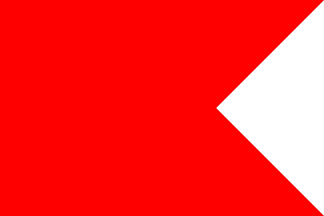
Flags C (Charlie), E (Echo) and
B (Bravo) in the International Code of Signals
- INTERNATIONAL CODE OF SIGNALS (or ICS)
- A code of single and multiple groups of letters with internationally agreed
meanings that can be transmitted by means of signal flags, radio or signal lanterns
(see also complement,
International Code of Signal Flags,
numeral pennant,
and signal flag).
Notes
a) The International Code of Signals was first
introduced (as the Commercial Code of Signals) in 1857, and whilst it has gone through
several revisions since that date, was also a further development of the code invented by
Captain Frederick Marryat RN, first published in 1817 (Marryat’s Code) – see
commercial code of signals,
distinction pennant
and Marryat's code.
b)
The ICS is currently published by the International Maritime Organization, and that
all references to the code given in this Dictionary are taken from the 2005 Edition.
- INTERNATIONAL COLOUR (or COLOR) CODE
- That code prescribed by the
Federation Internationale des Associations Vexillogiques
(FIAV) for use by the international vexillogical community, which lists the colours
employed on flags – see note below.

FAIV Code as used on FOTW and elsewhere (Peter Hans van den Muijzenberg)
Please note that R = red, Y = yellow, V = green (from vert/verde etc, in the Romance languages),
B = blue, O = orange, P = purple, G = grey, N = black (from noir/negro), W = white, Au = gold and
Ag = silver. Lighter shades are indicated by a minus sign thus light blue, for example, becomes B-, and
darker by a plus sign thus dark blue becomes B+ (with B++ being a very dark blue).
- INTERNATIONAL FLAG
- 1) The generic term for any flag that is recognized as having international
significance , for more precise definitions however, see 2) below (also
Geneva Convention flag,
safe conduct flag, and
supra-national flag).
- 2) The flag of an organization which represents the interests of a number
of different countries, as in for example, that of the Organization of American
States, the Association of South East Asian Nations or of OPEC, or that represents
an international non-governmental organization such as the International Olympic
Committee (see also sports flag 3).
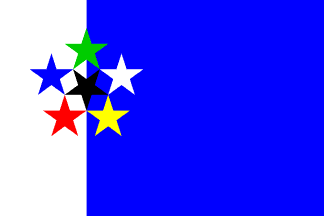
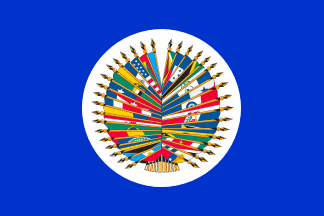
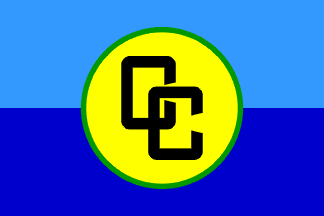
Flags FOTW, the Organization of American States
and the Caribbean Community








![[installation flag]](../images/v/vx-hr_banjj.gif)
![[institutional flag]](../images/v/vx-ca_uab.gif)
![[institutional flag]](../images/v/vx-ca_umani.gif)
![[institutional flag]](../images/v/vx-us@f-chf07.gif)
![[institutional flag]](../images/v/vx-us@f-chf06.gif)













![[Inglefield clip - left]](../images/v/vxt-d179.gif)
![[Inglefield clip - right]](../images/v/vxt-d181.gif)




